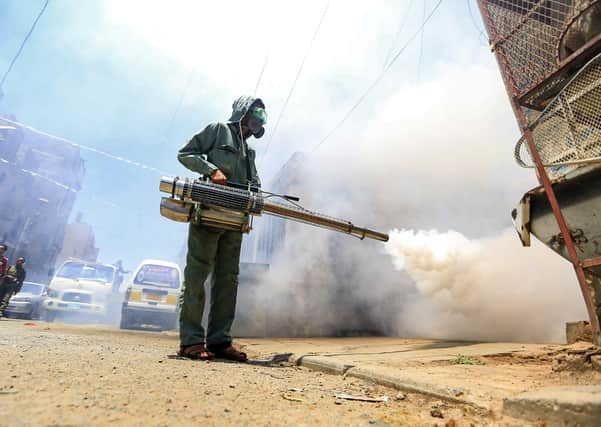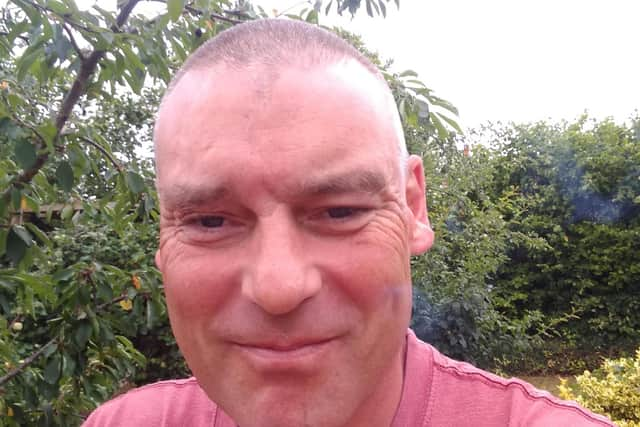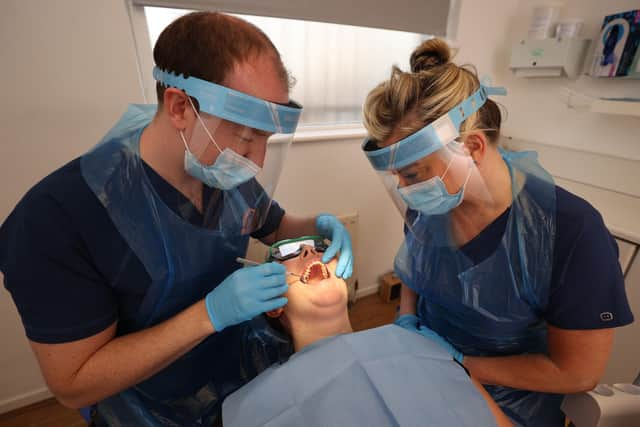From Armley to Yemen, an aid worker’s journey and Covid-19 SOS – Jonathan Cunliffe


It was a choice between the military or a caring profession, and after I saw my mother die of cancer as a teenager, I chose nursing.
Once I was trained, I worked in an oncology ward and settled in the city, buying a house in Armley. I had a happy, fulfilling time there, but eventually the adventurous side of me took over. I had itchy feet – with a purpose.
Advertisement
Hide AdAdvertisement
Hide AdI did some further specialist study in Liverpool in Tropical Medicines, Health and Hygiene. I then took the plunge to pull together my two loves and become a humanitarian aid worker.


For the last 23 years I have worked in some of the world’s most fragile places – I first ran a hospital in the Democratic Republic of Congo in Africa, and worked across the continent in Somalia, Sudan and Burundi, for the NGO Action Against Hunger.
For the last six years, I’ve been Regional Operations Director for the Middle East directing all Action Against Hunger’s operations to alleviate hunger and its causes.
That means I’m responsible for our work in Yemen, the war-torn country which has had half of its health centres and hospitals destroyed due to airstrikes and other attacks. I’ve spent three years there in total.
Advertisement
Hide AdAdvertisement
Hide AdBefore Covid, Yemen’s health system was overwhelmed. Now it’s drowning.


When I was working in Leeds, I was always sure of my pay packet at the end of the month. In Yemen, the doctors and nurses have been receiving no pay for months.
Families rely on remittances from relatives working overseas but these are now hugely reduced. Many now cannot afford to work, meaning there are even fewer functioning health facilities.
I was last there in March when Covid-19 was not really visible. Now the gravediggers say they are busier than ever before and families are losing loved ones daily.
Advertisement
Hide AdAdvertisement
Hide AdThe official figures do not show the true picture. They have declared around 1,500 cases and 425 dead. That’s a death rate approaching 30 per cent, whereas in the UK the figure is less than one per cent.
It gives you an idea how many people have not been tested because of lack of capacity. Estimates vary but, according to the London School of Tropical Medicine, infection rates are at least 50 per cent while the UN say they could be as high as between 80 and 90 per cent. Over the next month or so, we may be looking at around 80 to 90,000 dead.
There are many differences between Yemen and the UK. We have been hit very hard with coronavirus, but many people have been supported financially and have been able to stay at home and socially isolate.
People in Yemen can’t take the measures that we’ve taken. They can’t work from home, they have to go out and buy things at the market – there are no supermarket deliveries. They have to bring money home for their families.
Advertisement
Hide AdAdvertisement
Hide AdOn top of that, they don’t have the facilities to treat people like we have in the UK, and frontline health workers don’t have enough personal protective equipment (PPE). That’s why I’m behind the Disasters Emergency Committee (DEC) Coronavirus Appeal. Action Against Hunger is one of 14 member charities of DEC which come together in times of crisis to raise funds quickly.
The DEC is raising money for people in the most fragile places in the world. Yemen is the most fragile state on the globe – followed by Somalia, South Sudan, Syria and DRC. The DEC Appeal will help them, as well as Afghanistan and people in the Rohingya camps in Cox’s Bazar in Bangladesh.
All have huge populations of displaced people – forced from their homes by conflict, instability and drought, with little access to running water and soap to protect themselves.
We need your support to help people in these countries who are already devastated by war and conflict. Just £30 could provide six displaced families with enough soap for a month; £100 could provide PPE for one frontline health worker for four months. We can’t give them everything, but at least let’s give them a fighting chance.
Advertisement
Hide AdAdvertisement
Hide AdI know now, more than ever, people in the UK are struggling. But if you are able to lend your support, please donate at www.dec.org.uk.
Jonathan Cunliffe is Regional Operations Director of Action Against Hunger.
Editor’s note: first and foremost - and rarely have I written down these words with more sincerity - I hope this finds you well.
Almost certainly you are here because you value the quality and the integrity of the journalism produced by The Yorkshire Post’s journalists - almost all of which live alongside you in Yorkshire, spending the wages they earn with Yorkshire businesses - who last year took this title to the industry watchdog’s Most Trusted Newspaper in Britain accolade.
Advertisement
Hide AdAdvertisement
Hide AdAnd that is why I must make an urgent request of you: as advertising revenue declines, your support becomes evermore crucial to the maintenance of the journalistic standards expected of The Yorkshire Post. If you can, safely, please buy a paper or take up a subscription. We want to continue to make you proud of Yorkshire’s National Newspaper but we are going to need your help.
Postal subscription copies can be ordered by calling 0330 4030066 or by emailing [email protected]. Vouchers, to be exchanged at retail sales outlets - our newsagents need you, too - can be subscribed to by contacting subscriptions on 0330 1235950 or by visiting www.localsubsplus.co.uk where you should select The Yorkshire Post from the list of titles available.
If you want to help right now, download our tablet app from the App / Play Stores. Every contribution you make helps to provide this county with the best regional journalism in the country.
Sincerely. Thank you.
James Mitchinson
Editor
Comment Guidelines
National World encourages reader discussion on our stories. User feedback, insights and back-and-forth exchanges add a rich layer of context to reporting. Please review our Community Guidelines before commenting.